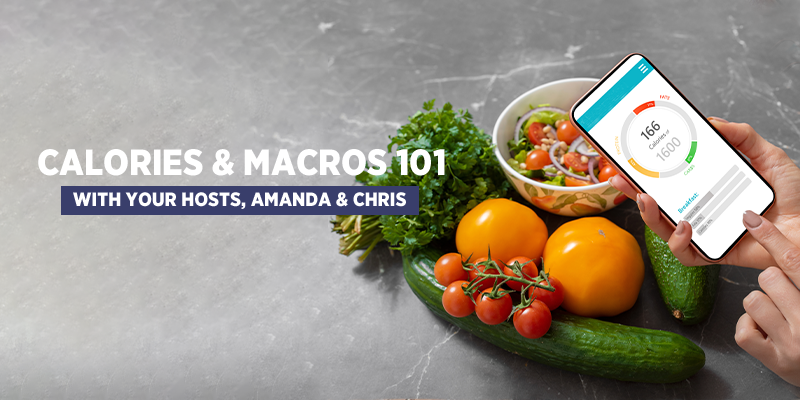
There are three basic components to every diet: carbs, protein, and fat. These macro nutrients that make up our food can be tracked and consumed strategically in order to optimize performance and hit goals (although it’s not necessary for success). Additionally, short-term tracking of calories and macros can help lead to a to a more balanced diet and better body composition change. In this episode we dive into why tracking calories and macros can be helpful for some, how to calculate the correct amounts for you, when to adjust, and more.
Episode 32: Calories & Macros 101
Show Notes
There are three basic components to every diet: carbs, protein, and fat. These macro nutrients that make up our food can be tracked and consumed strategically in order to optimize performance and hit goals (although it’s not necessary for success). Additionally, short-term tracking of calories and macros can help lead to a to a more balanced diet and better body composition change. In this episode we dive into why tracking calories and macros can be helpful for some, how to calculate the correct amounts for you, when to adjust, and more.
In this episode you’ll learn:
- Why tracking macros can be helpful
- About IIFYM (if it fits your macros) and how it works
- That tracking macros can help you find where you’re at
- Why protein is such an important macro nutrient
- How protein intake affects muscle
- What carbohydrates are and how they’re stored
- When is the optimal time of day to eat your carbs
- About carb cycling
- A few different option for macro ratios
- What net carbs are (usually for keto)
- About fats and why your body needs them
- What some side effects are of not getting enough fat
- About the ideal range of dietary fat for most people
- How to calculate your macros
- About online calculators
- About TDEE (total daily energy expenditure)
- General equations for calculation macros
- A few accurate ways to measure body fat percentage
- About the Mifflin-St Jeor equation and the Katch–McArdle equation
- Why it’s important to not over-exercise
- That it can be helpful to take a weekly average for weight
- How to work out your macros starting with calorie intake
- What lean body mass is and how to calculate it
- Some myths about eating a high protein diet
- How to find the right amount of carbs for you
- Low carb vs keto
- Why cookie cutter diet models aren’t effective
- About portion control and how tracking can help with it
Studies:
- In one study, increasing protein intake from 15% to 30% of calories made overweight women eat 441 fewer calories each day without intentionally restricting anything
- Studies show that protein is by far the most filling. It helps you feel more full — with less food
- “Protein Recommendations for Weight Loss in Elite Athletes: A Focus on Body Composition and Performance”
- https://journals.humankinetics.com/view/journals/ijsnem/28/2/article-p170.xml
- “A Systematic Review of Dietary Protein During Caloric Restriction in Resistance Trained Lean Athletes: A Case for Higher Intakes”
- https://journals.humankinetics.com/view/journals/ijsnem/24/2/article-p127.xml
- A high protein diet can worsen kidney function for people that already have kidney disease, but it does not affect kidney function in healthy adults.
- And we have a study in the show notes to back that
- https://www.ncbi.nlm.nih.gov/pmc/articles/PMC6236074/
- A meta-analysis actually concluded that high-protein is actually favorable and not detrimental to bone health.

Recent Comments